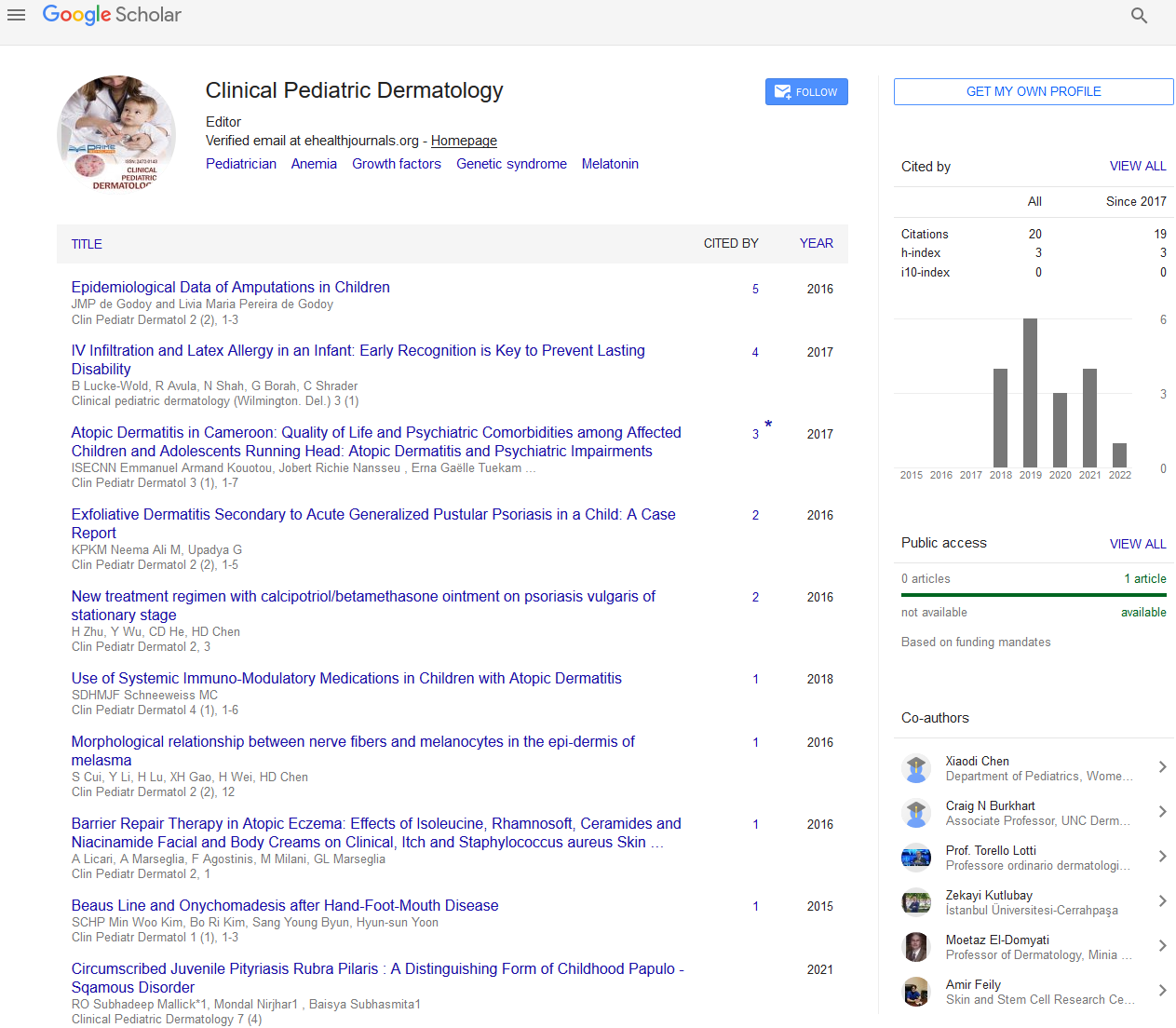Short Communication - (2023) Volume 9, Issue 2
Printable Personalized Sedate Conveyance Fix for the Topical Treatment of Skin Infections
Victoria P Werth*
Department of Dermatology, University of Pennsylvania, USA
*Correspondence:
Victoria P Werth,
Department of Dermatology, University of Pennsylvania,
USA,
Email:
Received: 31-May-2023, Manuscript No. IPCPDR-23-17103;
Editor assigned: 02-Jun-2023, Pre QC No. IPCPDR-23-17103 (PQ);
Reviewed: 16-Jun-2023, QC No. IPCPDR-23-17103;
Revised: 21-Jun-2023, Manuscript No. IPCPDR-23-17103 (R);
Published:
28-Jun-2023, DOI: 10.36648/2472-0143.9.2.14
Introduction
Skin diseases, encompassing a wide spectrum of conditions,
have a significant impact on millions of people worldwide. While
these conditions manifest visibly on the skin’s surface, the consequences
often extend beyond mere physical discomfort [1,2].
Many skin diseases are accompanied by a range of side effects
that can adversely affect an individual’s emotional, psychological,
and social well-being. In this article, we will explore the various
side effects of skin diseases, shedding light on their far-reaching
implications and highlighting the importance of comprehensive
management and support for those affected. Living with visible
skin conditions can cause significant emotional distress, leading to
feelings of embarrassment, self-consciousness, and anxiety. Social
stigmatization and fear of judgment may contribute to depression,
affecting an individual’s overall mental health and quality of life.
Skin diseases that alter the skin’s appearance, such as psoriasis,
vitiligo, or severe acne, can lead to body image concerns and a
negative self-perception. This can erode self-esteem, hinder social
interactions, and result in self-imposed isolation. The psychological
impact of chronic skin diseases can linger even after physical
symptoms have improved. This psychological scarring may lead to
long-term emotional issues that require support and counselling.
Fear of judgment or embarrassment due to visible skin conditions
can lead individuals to withdraw from social activities and avoid
public spaces. The isolation can exacerbate feelings of loneliness
and depression. Some skin diseases, like leprosy and certain fungal
infections, have been historically associated with stigma, discrimination,
and superstitions. Despite medical advances and public
awareness, discrimination against individuals with these conditions
can persist in certain societies.
Description
Skin diseases can strain personal relationships, especially if the
affected individual feels uncomfortable or judged by their appearance.
This strain can affect family dynamics, friendships, and
romantic relationships. Itching is a common symptom of various
skin diseases, including eczema, psoriasis, and hives. Persistent
itching can be incredibly distressing and lead to scratching, which
can exacerbate the condition and potentially cause skin infections.
Inflammatory skin conditions like cellulitis or abscesses can cause
pain, tenderness, and discomfort, affecting mobility and daily activities.
Some skin diseases, such as impetigo or pemphigus, can
lead to open sores and wounds. These vulnerable areas are prone
to infections and may take longer to heal. Damaged skin barriers,
common in many skin diseases, can make individuals more susceptible
to infections caused by bacteria, viruses, and fungi. Severe
skin conditions or repeated flare-ups can result in scarring and
permanent disfigurement. This can further contribute to emotional
distress and impact self-confidence. Some skin diseases, such as
actinic keratosis or chronic ulcers, can increase the risk of developing
skin cancer, particularly if not properly managed or treated.
Itching, pain, or discomfort associated with skin diseases can disrupt
sleep patterns, leading to insomnia and fatigue. Skin diseases,
especially those with visible symptoms, can impact an individual’s
concentration and productivity at work or school. Frequent medical
appointments and treatment regimens can also cause work or
study disruptions [3-5]. The costs associated with managing skin
diseases, including doctor’s visits, medications, and specialized
treatments, can impose financial strain on affected individuals and
their families.
Conclusion
The side effects of skin diseases go far beyond physical discomfort.
Emotional distress, social isolation, and negative self-perception
are just some of the many repercussions individuals face while
coping with these conditions. The stigma associated with certain
skin diseases further exacerbates the burden on affected individuals.
As a society, it is crucial to foster understanding, empathy, and support for those living with skin diseases.
Acknowledgement
None.
Conflict Of Interest
The author’s declared that they have no conflict of interest.
References
- Hay RJ, Johns NE, Williams HC, Bolliger IW, Dellavalle RP, et al. (2014) The global burden of skin disease in 2010: An analysis of the prevalence and impact of skin conditions. J Invest Dermatol 134(6): 1527-1534.
[Crossref] [Google Scholar] [PubMed]
- Lim HW, Collins SAB, Resneck JS, Bolognia JL, Hodge JA, et al. (2017) The burden of skin disease in the United States. J Am Acad Dermatol 76(5): 958-972.
[Crossref] [Google Scholar] [PubMed]
- Duong TA, Allanore LV, Wolkenstein P, Chosidow O (2017) Severe cutaneous adverse reactions to drugs. Lancet 390(10106): 1996-2011.
[Crossref] [Google Scholar] [PubMed]
- Madan RK, Levitt J (2014) A review of toxicity from topical salicylic acid preparations. J Am Acad Dermatol 70(4): 788-792.
[Crossref] [Google Scholar] [PubMed]
- Liu Y, Jain A, Eng C, Way DH, Lee K, et al. (2020) A deep learning system for differential diagnosis of skin diseases. Nat Med 26(6): 900-908.
[Crossref] [Google Scholar] [PubMed]
Citation: Werth VP (2023) Printable Personalized Sedate Conveyance Fix for the Topical Treatment of Skin Infections. Clin Pediatr Dermatol. 9:14.
Copyright: © 2023 Werth VP. This is an open-access article distributed under the terms of the Creative Commons Attribution License, which permits unrestricted use, distribution, and reproduction in any medium, provided the original author and source are credited.

